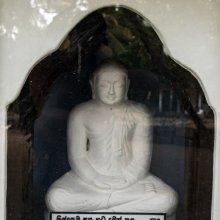Vessabhu, Vessabhū: 1 definition
Introduction:
Vessabhu means something in Buddhism, Pali. If you want to know the exact meaning, history, etymology or English translation of this term then check out the descriptions on this page. Add your comment or reference to a book if you want to contribute to this summary article.
Images (photo gallery)
In Buddhism
Theravada (major branch of Buddhism)
Source: Pali Kanon: Pali Proper Names1. Vessabhu. The twenty first of the twenty four Buddhas. He was born in the pleasance of Anoma (Commentary, Anupama), his father being the khattiya Suppatita (Supatita) and his mother Yasavati.
On the day of his birth he roared like a bull a shout of triumph, hence his name (vasabhanadahetutta). (But MT. 63 gives another explanation: hinam jananam abhibhuto maggena abhibhavitakilesahino ti va. Dvy.333 calls him Visvabhu).
For six thousand years he lived in the household in three palaces: Ruci, Suruci and Vaddhana (Rativaddhana); his wife was Sucitta, and their son Suppabuddha. He left home in a golden palanquin, practiced austerities for six months, was given milk rice by Sirivaddhana of Sucittanigama, and grass for his seat by the Naga king Narinda, and attained Enlightenment under a sala tree. He preached his first sermon at Anurarama to his brothers, Sona and Uttara, who became his chief disciples.
Among women his chief disciples were Dama and Samala, his constant attendant Upasanta (Upasannaka), his chief lay patrons Sotthika and Rama among men, and Gotami (Kaligotami) and Sirima among women. He was sixty cubits in height and lived for sixty thousand years. He died at the Khemarama in Usabhavati and his relics were scattered. The Bodhisatta was King Sudassana of Sarabhavati. (Bu.xxii.1ff.; BuA.205ff.; D.ii.5.; J.i.41).
Vessabhu Buddha kept the uposatha once in every six years. DhA.iii.236.
2. Vessabhu. King of Avanti in the time of Renu. His capital was Mahissati. D.ii.236.
Theravāda is a major branch of Buddhism having the the Pali canon (tipitaka) as their canonical literature, which includes the vinaya-pitaka (monastic rules), the sutta-pitaka (Buddhist sermons) and the abhidhamma-pitaka (philosophy and psychology).
See also (Relevant definitions)
Full-text (+34): Sucitta, Dama, Narinda, Suppatita, Samala, Tindukaphaladayaka, Sarabhavati, Sotthika, Ambatakiya, Ekavandiya, Bhojanadayaka, Kesarapupphiya, Vaddhana, Saccasannaka, Citakanibbapaka, Sanghupatthaka, Sumanaveliya, Sirivaddhana, Kanikaracchadaniya, Isisattama.
Relevant text
Search found 10 books and stories containing Vessabhu, Vessabhū; (plurals include: Vessabhus, Vessabhūs). You can also click to the full overview containing English textual excerpts. Below are direct links for the most relevant articles:
Apadana commentary (Atthakatha) (by U Lu Pe Win)
Commentary on Biography of the thera Bhisadāyaka < [Chapter 7 - Sakacintaniyavagga (section on Sakacintaniya)]
Various other 22 Buddhas < [Part 1 - Remote preface (dūre-nidāna)]
Establishing Many Monasteries < [Part 3 - Discourse on proximate preface (santike-nidāna)]
The Great Chronicle of Buddhas (by Ven. Mingun Sayadaw)
Buddha Chronicle 21: Vessabhu Buddhavaṃsa < [Chapter 9 - The chronicle of twenty-four Buddhas]
The Four Avijahitaṭṭhāna (Four Sacred Places) < [Chapter 25 - The Buddha’s Seventh Vassa]
Supplement (d): The Eight Differences (vematta) < [Chapter 9 - The chronicle of twenty-four Buddhas]
Maha Prajnaparamita Sastra (by Gelongma Karma Migme Chödrön)
I. Apparent longevity of the buddhas < [Part 16 - Obtaining the immense longevity and immense radiance of the Buddhas]
Appendix 6 - Division of the great earth of Jambudvīpa into seven parts < [Chapter VIII - The Bodhisattvas]
The Book of Protection (by Piyadassi Thera)
Discourse 5 - Protection Of The Aggregates < [Discourses]
Discourse 24 - Discourse On Atanatiya < [Discourses]
Vinaya Pitaka (1): Bhikkhu-vibhanga (the analysis of Monks’ rules) (by I. B. Horner)
Monks’ Expulsion (Pārājika) 1: The origin of the Vinaya < [Monks’ Expulsion (Pārājika) 1]
The Catu-Bhanavara-Pali (critical study) (by Moumita Dutta Banik)
(8) Atanatiya-sutta < [Chapter 4 - Subject Matter of the Third Bhanavara]
